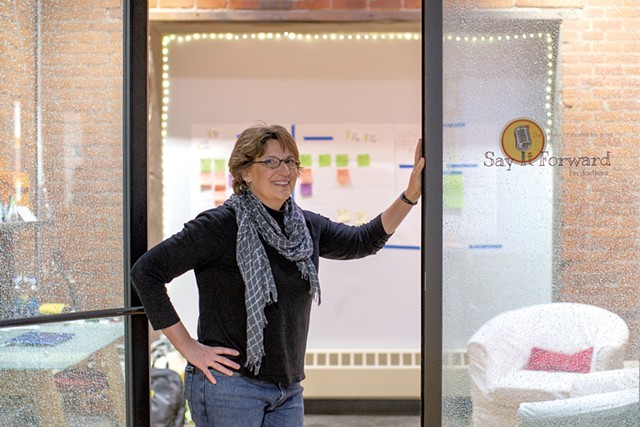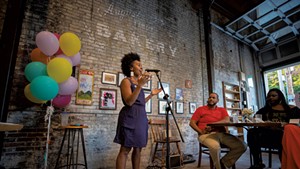
- Luke Awtry
- Sue Schmidt
When Susanne Schmidt was in seventh grade, one of her friends dared her to bring weed to school. With the help of her older brother, Schmidt came through. Upon seeing the contraband the next day, this so-called friend immediately ratted her out to the principal, who found a few buds inside a Tic Tac container in Schmidt's locker. (Has there ever been a more preciously junior-high drug bust?) The next thing she knew, Schmidt was under arrest for possession with intent to distribute.
"I mean, come on. How much did they think I was gonna fucking distribute?" Schmidt said in her South End office on a recent afternoon, holding up her pinky finger. "It was maybe two tiny Js worth of dope. But this was 1974, when people thought weed was basically heroin, and it was just about the worst thing that could have happened."
Sporting socks adorned with little fox faces, Schmidt occasionally paused her tale of juvenile delinquency to squeal at two adorable dogs pressing their noses against her glass door. Anyone hanging out in fox socks in a pet-friendly coworking space is likely cruising along on the high seas of life. Schmidt, now 56, sees a cosmic thread from her unruly past to her fox-sock-wearing present. In a sense, the arc of her existence rests on the unlikely pillars of two pinky-size joints.
Schmidt, a licensed mental health counselor and a professional storyteller, has made a career out of finding the narrative in life's episodic twists and turns. Since getting her start onstage with the Vermont Comedy Divas in 2012, Schmidt has become something of a niche celebrity. In 2014, she performed at Burlington's inaugural Moth, a live storytelling event. Later that year, she won a StorySLAM in the Queen City for her tale of "extreme camping" on Long Island; it involved several fathers tasked with supervising young children, copious amounts of gasoline and a large explosion. In 2015, she won the Valley Voices Grand Slam in Northampton, Mass., a competition presented by New England Public Radio and the Academy of Music Theatre.
Since then, Schmidt has been the regional producer of the Moth and a regular contributor to slams and storytelling events across the country, performing in cities as far-flung as Miami and Anchorage, Alaska. She also teaches a storytelling workshop at the Flynn Center for the Performing Arts and is cofounder of Say It Forward Productions, a nonprofit that organizes storytelling events for corporate fundraisers.
Kevin Gallagher, who cofounded Say It Forward with Schmidt, entered the Burlington storytelling scene around the same time that she did. The fellow performer says he admires Schmidt's attention to craft.
"She's a very thoughtful, precise storyteller," Gallagher said. "She understands the balance between content and timing, the two things that create a really good story. Onstage, she tells her stories in a way that makes you feel like she's telling it to you."
About that weed saga: Schmidt paid her penance with a few months of court-ordered therapy, and she was technically on probation until age 18. She never revealed her brother as the pot source, blaming it instead on the age-old scapegoats: "some kids in the woods."
Things took a turn for the better in eighth grade, when Schmidt transferred to an evangelical Christian school. It was her mother's idea, but Schmidt, not much of a hellion at heart, went along without protest. There, to her atheist father's dismay, she discovered an affinity for religion.
Schmidt lasted two years as a religious studies major at Lynchburg College in Virginia before she realized that, as a Long Island girl who grew up surrounded by her mother's loud Italian family, she didn't feel quite at home in the South. Through that experience, she found her real calling — "studying compassion and healing, except in a secular way," said Schmidt.
She finished college at Plymouth State University in New Hampshire, then earned a master's degree in counseling from the University of Vermont. She's been in Burlington ever since, working as a mental health counselor and — after a friend dared her in 2012 to take a Flynn comedy improvisation class — becoming a troubadour about town. (Dares seem to be the major plot engine in Schmidt's life.)
Schmidt's storytelling gene comes from her mother's side of the family, a clan of Italian Brooklynites who often lingered for hours after a meal, attempting to out-yarn each other. They'd continue until her grandfather, a psychiatrist at a state hospital — who, Schmidt is pretty sure, routinely removed bullets from Mob guys who showed up on his doorstep — took his napkin out of his collar and tossed it on the table. It was the signal that the best story had been told — the original mic drop.
"My family invented the story slam," Schmidt joked.
Schmidt got her start in standup, but her performances have evolved into the kind of genre-bending sets pioneered by artists such as Mike Birbiglia, Tig Notaro and Hannah Gadsby, whose material often hovers in the murky emotional territory between funny and sad. That in-between zone, said Schmidt, is storytelling in its purest form.
But "storytelling," spoken in reverent tones by everyone from public radio hosts to CEOs to twentysomething social-media influencers, has become a vague buzzword with a slippery meaning. At some point in the last decade, PR firms began helping companies "tell their brand story." Instagram developed a feature called a "story" that allows users to post images that disappear after 24 hours. The proliferation of podcasts has spawned endless opportunities for people to broadcast themselves under the roomy umbrella of storytelling, as if anything said into a microphone sotto voce automatically has a plot.
This sudden commodification of one of the oldest, lowest-tech forms of entertainment irks Schmidt.
"Why did we suddenly get all precious about storytelling?" she lamented. "If there's nothing in a story that makes people laugh at themselves, then it just feels really message-y to me. Like, are we in church?"
For Schmidt, storytelling is a practice that involves feeling, substance and, crucially, structure.
"Some people just get up on stage and tell you their slice of life from start to finish. Sue is really focused on craft, which comes from her background structuring jokes in comedy," said Lovejoy Dole, who started the state's longest-running storytelling open mic, Extempo, in the Montpelier area in 2010. (Schmidt has won the juried Extempo competition seven times.) "I've seen audiences really respond to her stories, and it's partly because she's able to hit those mile markers that people are always subconsciously listening for."
Schmidt's voice is baseline funny — just a little gravelly and streetwise, hinting at her Long Island roots. Even if "comedy" is too narrow a description of her work, she tends to use humor as a vehicle, a way of coming out on the other side of an experience. She views storytelling as equal parts science and art, a precise ratio of ingredients — setup, desire, setback, climax, resolution. Those elements, combined correctly, should produce something that feels seamless, she says.
"I have an incredible need to put things in some kind of order," said Schmidt. "I don't tell stories about things I haven't resolved in myself, or else that process doesn't work."
Recently, Schmidt appeared on a CBS News segment dedicated to the Vermont storytelling scene. The piece portrayed the state as a magical hygge hinterland where storytellers get recognized on the streets (which has actually happened to Schmidt).
Twee-ness aside, something about Vermont fosters a tangible sense of connection between performer and audience, said Schmidt. "It's not unusual to walk down the street and hear someone scream out, 'Hey, storyteller!'" she told CBS News. "That would absolutely be a Vermont moment."
A few months ago, while Schmidt was in a coffee shop, she heard someone yell, "We love the fathers!" — a line from the story about the camping incident, which she's performed several times since winning the 2014 Moth StorySLAM.
"I turned around, and this woman goes, 'I heard you tell that story a few months after my father died, and it was exactly what I needed to hear,'" Schmidt said. "That was like, whoa."
There are many parallels between Schmidt's counseling work and her storytelling. "Everybody's life is messy in some way," she said. "We're all trying to talk about something. We have these things that we think define our lives, and the art of storytelling is about creating meaning for ourselves, which is what therapy is also about."
Ultimately, Schmidt feels that storytelling represents the end goal of counseling: getting people comfortable enough with their lives to talk about them out in the open.
During the Moth StorySLAM at ArtsRiot last week, a young woman told the winning story about how, as a girl, she once watched her inebriated father throw a drink in her mother's face. The next morning, when her father acted like nothing had happened, she mustered up her kid courage and threw a glass of milk back at him.
"Honestly, I would have preferred an ending where she looked at the glass of milk in her hand, then looked at her father but didn't throw it at him," said Schmidt by phone after the event. "That would have been more consistent with my sense of her character. But human beings are hardwired to like satisfying arcs, and that was a really, really satisfying one."











Comments
Showing 1-1 of 1
Comments are closed.
From 2014-2020, Seven Days allowed readers to comment on all stories posted on our website. While we've appreciated the suggestions and insights, right now Seven Days is prioritizing our core mission — producing high-quality, responsible local journalism — over moderating online debates between readers.
To criticize, correct or praise our reporting, please send us a letter to the editor or send us a tip. We’ll check it out and report the results.
Online comments may return when we have better tech tools for managing them. Thanks for reading.